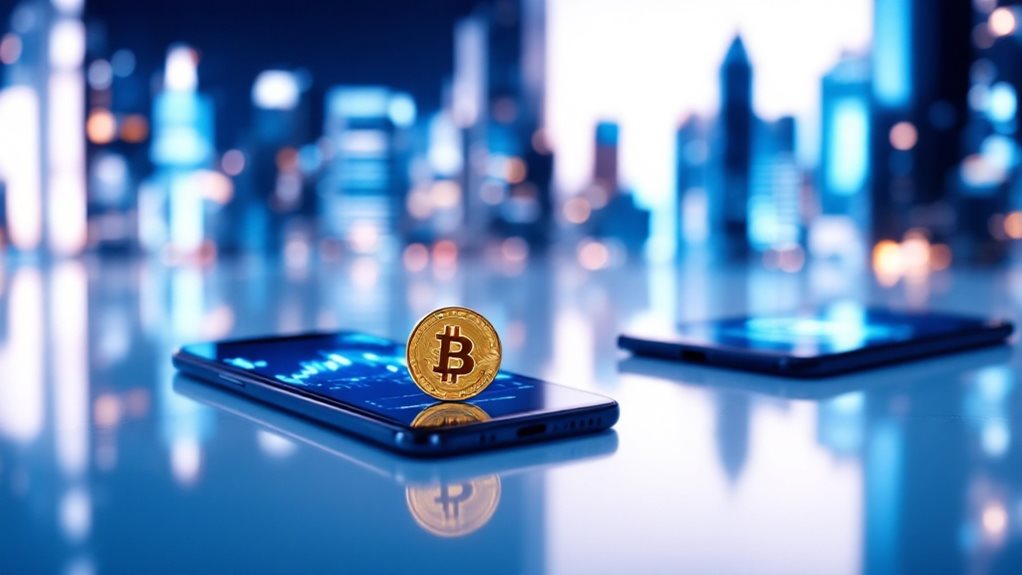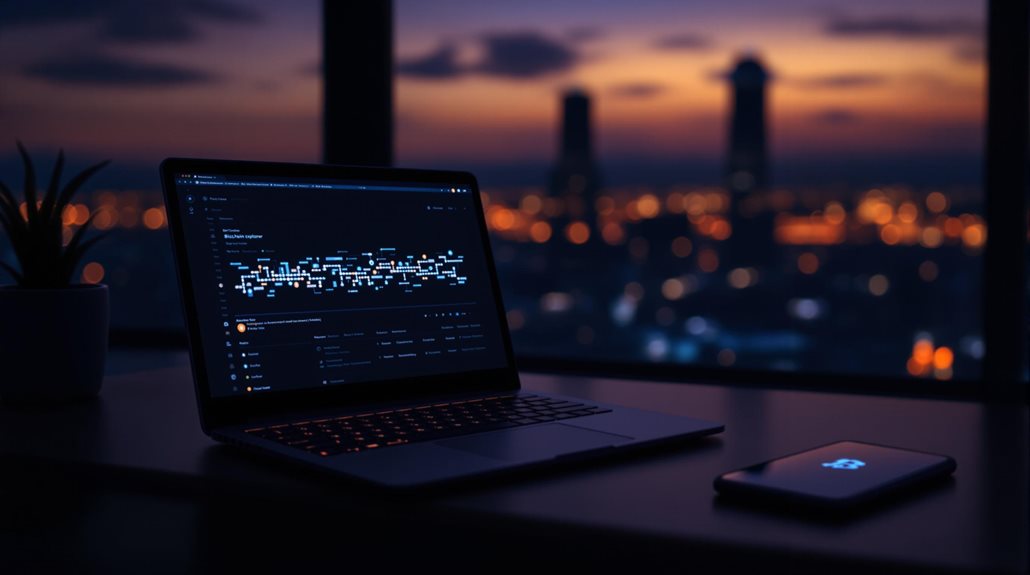Bitcoin is a digital currency that was created in 2009 by Satoshi Nakamoto. It lets people send money directly to each other over the internet without banks or middlemen. Bitcoin works on a technology called blockchain, which records all transactions in a public digital ledger. Special computers called miners verify these transactions and earn new bitcoins as rewards. There's much more to discover about how this revolutionary digital money is changing the way people handle payments worldwide.

Bitcoin is a digital cryptocurrency that arrived on the scene in 2009 when a mysterious creator known as Satoshi Nakamoto introduced it to the world. It's the first widely-adopted cryptocurrency, operating on a decentralized network where users can send money directly to each other through the internet without needing a bank or middleman.
The system works through a technology called blockchain, which is like a public digital ledger that records all transactions. When someone sends bitcoins to another person, the transaction is verified by computers on the network called nodes. These computers, run by people called miners, solve complex mathematical puzzles to confirm transactions and add them to the blockchain. As a reward for their work, miners receive new bitcoins. The mining process has become increasingly competitive, with the network now generating 745 quintillion hashes per second.
The mining process uses a special encryption method called SHA-256 to keep transactions secure. Every 2,016 blocks, the network adjusts how difficult it is to mine bitcoins, helping to maintain a steady flow of new coins. Currently, miners receive 6.25 bitcoins as a reward for each block they successfully mine. This reward undergoes block reward halving every four years. There will only ever be 21 million bitcoins in total, making it different from regular money that can be printed endlessly.
People store their bitcoins in digital wallets, which can be on their computers, phones, or online exchanges. Each wallet has two important keys: a public key that works like an email address for receiving bitcoins, and a private key that's like a password for spending them. The smallest amount of bitcoin someone can own is called a Satoshi, which is equal to 0.00000001 bitcoin. Bitcoin reached a significant milestone when its price hit $100,000 in December 2024.
Bitcoin has become popular both as an investment and as a way to pay for things. While not all stores accept bitcoin, more businesses are starting to take it as payment. People can also exchange their bitcoins for regular money through cryptocurrency exchanges. Each transaction gets permanently recorded on the blockchain, making it possible to track the history of any bitcoin from the moment it was created.
The technology behind Bitcoin represents a significant change in how people can handle money in the digital age. Unlike traditional banking systems, Bitcoin operates 24/7, allows for quick international transfers, and doesn't require permission from any central authority to use. These features have helped make it the most well-known cryptocurrency in the world. Investors can make money through value appreciation as Bitcoin's market price increases over time.
Frequently Asked Questions
How Secure Is Bitcoin Compared to Traditional Banking Systems?
Bitcoin's security features make it highly secure compared to traditional banking. It uses advanced SHA-256 encryption and doesn't store personal data, reducing identity theft risks.
While banks can reverse transactions and face hacking threats, Bitcoin's transactions can't be reversed and its decentralized network makes large-scale hacks nearly impossible.
However, individual Bitcoin wallets can still be compromised if users don't follow proper security practices.
What Happens to My Bitcoins if I Lose My Digital Wallet?
When someone loses their Bitcoin wallet, their coins aren't actually gone – they're still on the blockchain.
But without the wallet's private keys or recovery phrase, they can't access those coins anymore. It's like having money locked in a safe without the combination.
Studies suggest 3-4 million bitcoins are permanently lost this way.
Once access is lost, there's no central authority or bank that can help recover them.
Can Governments Ban or Regulate Bitcoin Transactions?
Governments can try to regulate Bitcoin, but it's tough to ban completely.
While they can't shut down the Bitcoin network itself, they can make it harder to use by restricting exchanges, blocking websites, or making it illegal to trade.
Some countries have strict rules, while others are more open.
Even in places with bans, people often find ways around them since Bitcoin is decentralized and operates across borders.
Why Does Bitcoin's Price Fluctuate so Dramatically?
Bitcoin's price swings dramatically due to several key factors.
It's traded 24/7 worldwide, and its limited supply makes it sensitive to changes in demand. News about regulations, government actions, or major investors can quickly affect market sentiment.
The cryptocurrency's relatively new market lacks the stability mechanisms found in traditional markets. Additionally, social media buzz and FOMO (fear of missing out) can trigger rapid buying or selling waves.
How Many Retailers and Businesses Currently Accept Bitcoin as Payment?
Globally, over 15,000 businesses accept Bitcoin for payments.
In the U.S., about 2,300 businesses take Bitcoin, with California leading at 440 businesses and New York following with 148.
Major companies like Microsoft, AT&T, and Overstock.com are on board.
For large businesses making over $1 billion in online sales, 85% accept crypto payments.
Among all merchants, 46% currently take cryptocurrency as a payment option.





